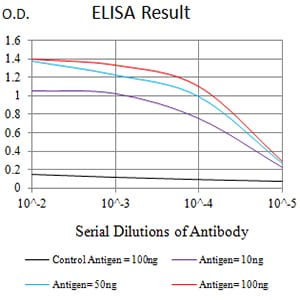KIR3DL1 Primary Antibody
Item Information
Catalog #
Size
Price
Description
Killer cell immunoglobulin-like receptors (KIRs) are transmembrane glycoproteins expressed by natural killer cells and subsets of T cells. The KIR genes are polymorphic and highly homologous and they are found in a cluster on chromosome 19q13.4 within the 1 Mb leukocyte receptor complex (LRC). The gene content of the KIR gene cluster varies among haplotypes, although several "framework" genes are found in all haplotypes (KIR3DL3, KIR3DP1, KIR3DL4, KIR3DL2). The KIR proteins are classified by the number of extracellular immunoglobulin domains (2D or 3D) and by whether they have a long (L) or short (S) cytoplasmic domain. KIR proteins with the long cytoplasmic domain transduce inhibitory signals upon ligand binding via an immune tyrosine-based inhibitory motif (ITIM), while KIR proteins with the short cytoplasmic domain lack the ITIM motif and instead associate with the TYRO protein tyrosine kinase binding protein to transduce activating signals. The ligands for several KIR proteins are subsets of HLA class I molecules; thus, KIR proteins are thought to play an important role in regulation of the immune response.
Product Overview
Entrez GenelD
3811
Aliases
KIR; NKB1; NKAT3; NKB1B; NKAT-3; CD158E1; KIR3DL1/S1
Clone#
6D9F6
Host / Isotype
Mouse / IgG2b
Species Reactivity
Human, Monkey, Rat
Immunogen
Purified recombinant fragment of human KIR3DL1 (AA: extra 22-340) expressed in Hek293 cells.
Formulation
Purified antibody in PBS with 0.05% sodium azide
Storage
Store at 4°C short term. Aliquot and store at -20°C long term. Avoid freeze/thaw cycles.
Product Applications
WB (Western Blot)
1/500 - 1/2000
IHC_P(Immunohistochemistry)
1/200 - 1/1000
ELISA
1/10000
References
1.Clin Exp Immunol. 2016 Mar;183(3):419-30.
2.J Leukoc Biol. 2010 Nov;88(5):905-12.
2.J Leukoc Biol. 2010 Nov;88(5):905-12.
Product Image
Elisa

Figure 1: Black line: Control Antigen (100 ng);Purple line: Antigen (10ng); Blue line: Antigen (50 ng); Red line:Antigen (100 ng)
Western Blot

Figure 2:Western blot analysis using KIR3DL1 mAb against human KIR3DL1 (AA: extra 22-340) recombinant protein. (Expected MW is 65 kDa)
Western Blot

Figure 3:Western blot analysis using KIR3DL1 mouse mAb against A431 (1), Raji (2), SPC-A-1 (3), K562 (4), HEK293 (5), U937 (6), C6 (7), and COS7 (8) cell lysate.
Immunohistochemical analysis

Figure 4:Immunohistochemical analysis of paraffin-embedded cervical cancer tissues using KIR3DL1 mouse mAb with DAB staining.
For Research Use Only. Not for use in diagnostic procedures.

